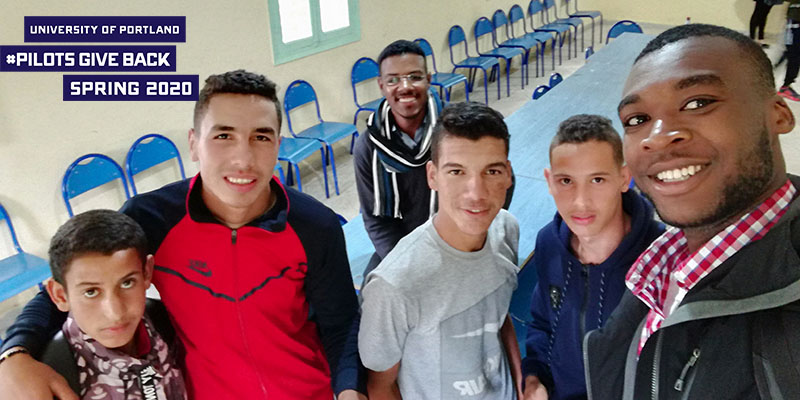
 Kenechi (Kene) Anigbogu ’18 was a member of the 100th group of American Peace Corps volunteers to serve in Morocco.
Kenechi (Kene) Anigbogu ’18 was a member of the 100th group of American Peace Corps volunteers to serve in Morocco.
He served in Afourer, a town in the Beni-Mellal region of central Morocco. As a youth development specialist, Kene taught English and life skills at a boarding school and a youth cultural center. He spent a lot of time in the local recreation center. His years working at UP’s Beauchamp Center, playing and coaching basketball, turned out to be good preparation.
“At first it felt like I was just like a random person that came to the community,” Kene says. “Gradually, more and more people—especially the kids—knew who I was. They would see me in the street and yell, ‘Kene!’”
But Kene noticed there were hardly any girls or women playing sports. “During Ramadan, there was a big soccer tournament. The place was packed. It was the main event in the community. I asked, ‘Why are there no girls? Is there time for them to have a tournament?’” It inspired a project to organize a girls’ soccer tournament and coach a girls’ soccer team. “There are a lot of different cultural norms to be aware of,” he explains, “but I wanted to make a tournament to get more awareness for girls, of what they’re capable of doing. Let them know there is a space available.”
The tournament was a success, and soon, more girls started coming to the rec center to play soccer. The girls wanted to start playing basketball and handball, too, and the older high school girls were mentoring the younger girls. There was a noticeable impact on the girls’ self-esteem. “They had more friends; they started coming out of their shell and having fun.”
Unfortunately, Kene’s service in Morocco was cut short by the COVID-19 pandemic. At first, most people doubted it would come to Morocco, but the virus spread, along with the apprehension of his colleagues. As a warden for his region, Kene was responsible for the safety of fellow volunteers. “The whole world is going through it, what makes Morocco different; how are they going to handle it?” he recalls thinking. They watched as volunteers from China were evacuated. Italy went into lockdown. Soon it became clear that leaving was inevitable. “This is big,” he realized. “This is something different.”
First came the “stand fast” order, instructions to stay home and have an emergency backpack ready. After that, everything happened quickly. “I wasn’t able to tell everyone in our community goodbye,” Kene says. “I was able to talk to my host family, tell them maybe I’ll come back, but you never know.” When the evacuation orders came through, he took a bus with other volunteers to a consolidation point—a hotel in the capital city of Rabat.
Plans had to be adapted at every step to a rapidly changing situation. Peace Corps chartered a flight from Rabat to Washington, D.C., but then airports started shutting down. Their departure date was moved up. The government ordered no more gatherings of over 20 people, but Kene was in a hotel with 185 other volunteers, all trying to figure out how they would get home. They held a makeshift closing-of-service ceremony, a bittersweet acknowledgement that despite a service cut short, it was a service complete.
Upon arrival in Washington, D.C., there was an eerie emptiness in the airport. Only 60 people were on his flight back to San Francisco. Kene likes to joke that, growing up in San Francisco, the BART train is like an old friend, and seeing the stations and trains empty, that’s when it really hit him.
The transition back to life in the US has been strange. “It’s like I’m home, but I haven’t really left Morocco at the same time,” he says. “In Morocco, you spend a lot of time at home, especially during Ramadan, fasting.” But there are striking contrasts. “I’m doing the same things, but I look outside and I see all the cars on the street. I would never see that many cars.” His younger brother is still taking online classes. “In America you can continue your education,” he says. “But in Morocco, they can only deal with it to a certain extent. They closed down the sports center and schools. What happens to the people about to graduate? How are they still getting an education? What will they do? That’s when you start to see some differences.”
Kene seems to have accepted, even embraced the ambiguity of the present. He grew accustomed to uncertainty during his time in the Peace Corps, to periods of planning and transition, to decision making in insecure and unfamiliar environments. “There was work to be done, and a lot of downtime,” he says. “I’ve had time to think about my future. I’m just making sure that I’m doing something that makes me happy and also makes an impact on the community.”